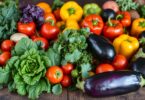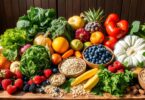Healthy Food: Nourishing Your Body the Right Way
Healthy food choices are key to optimal health and well-being. But what really makes food “healthy,” and how does it nourish us?
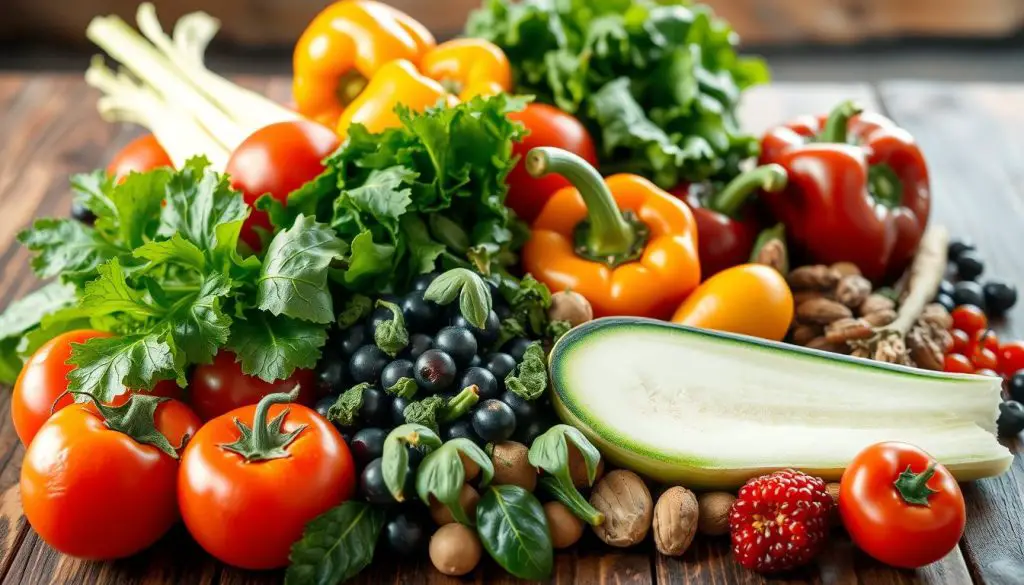
This guide will show you how to add nutrient-rich foods, superfoods, and plant-based meals to your diet. It’s a step towards a healthier, more vibrant life.
Key Takeaways
- Discover the benefits of a whole-food, plant-based diet for optimal nutrition and well-being.
- Learn how to eliminate processed and refined foods in favor of clean, minimally processed ingredients.
- Explore the role of superfoods in supporting overall health and vitality.
- Understand the importance of dietary fiber and its impact on digestive and cardiovascular health.
- Cultivate a positive relationship with food through mindful eating practices.
Embracing a Whole-Food, Plant-Based Diet
Choosing a whole-food, plant-based diet can change your life for the better. It focuses on eating foods like fruits, veggies, whole grains, and legumes. These foods give you the vitamins, minerals, and antioxidants your body needs.
The Benefits of Nutrient-Dense Whole Foods
Whole foods are key to a healthy, plant-based diet. They’re full of nutrients that help keep you healthy. Eating these foods can boost your digestive health, heart health, and immune system.
Incorporating More Fruits and Vegetables
Fruits and veggies are the heart of a whole-food diet. They’re rich in nutrients like phytochemicals, antioxidants, and fiber. Adding more of these foods to your diet can greatly improve your health and mood.
| Nutrient-Dense Whole Foods | Health Benefits |
|---|---|
| Leafy Greens | Rich in vitamins, minerals, and antioxidants that support immune function and heart health. |
| Berries | High in fiber, vitamins, and phytochemicals that can improve brain function and reduce inflammation. |
| Whole Grains | Provide complex carbohydrates, fiber, and B vitamins to support steady energy levels and digestive health. |
| Legumes | A excellent source of plant-based protein, fiber, and essential nutrients that promote overall well-being. |
By choosing a whole-food, plant-based diet, you start a journey to better health. This way of eating can lead to many benefits, like better dietary supplements and overall wellness.
Healthy Food: Understanding Balanced Nutrition
Keeping a healthy diet is more than picking “healthy” foods. It’s about knowing how to balance your nutrition. This means getting the right mix of carbs, proteins, and fats for your body’s health.
Carbs are your main energy source. They help you stay active and keep your brain sharp. Choose complex carbs like whole grains, fruits, and veggies for lasting energy and lots of vitamins.
Proteins are key for fixing tissues, building muscles, and keeping your immune system strong. Eat a variety of protein-rich foods like lean meats, fish, legumes, and plant-based options. This ensures you get all the amino acids your body needs.
Fats are important for hormones, absorbing nutrients, and brain health. Eat healthy fats from avocados, nuts, seeds, and olive oil. But cut down on bad fats like saturated and trans fats.
Knowing how carbs, proteins, and fats work together helps you eat well. This journey supports your health and well-being.
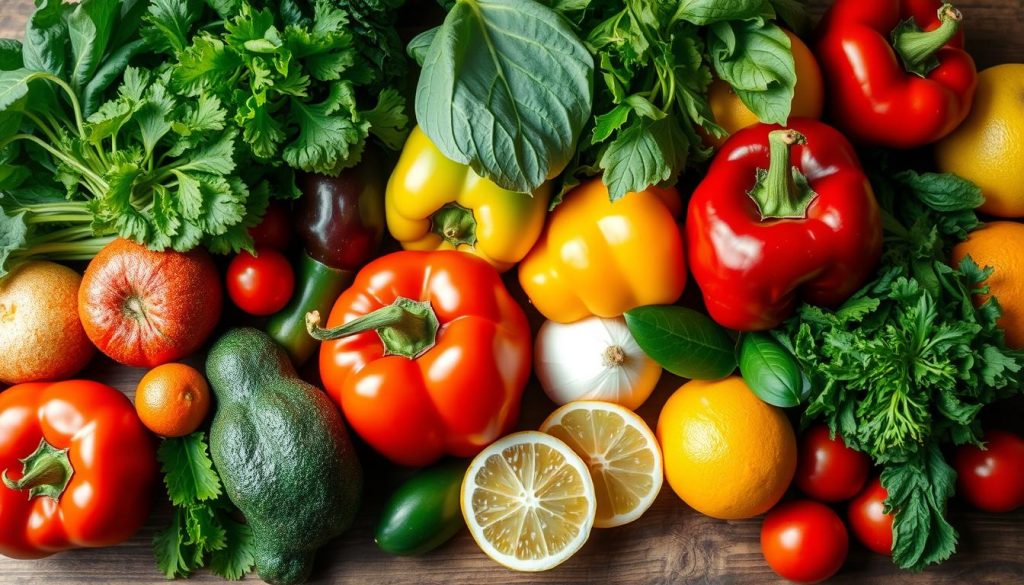
“The key to a healthy diet is not deprivation, but rather a balanced and mindful approach to nutrition.” – Renowned Nutritionist, Dr. Emma Wilkins
A healthy diet isn’t about strict rules. It’s about finding a flexible, balanced way to eat that fits you. Try different whole foods to find what keeps you full of energy and life.
The Power of Clean Eating
Clean eating is becoming more popular for a healthier lifestyle. It means eating whole, minimally processed foods. This way, we avoid processed and refined items and get the nutrients our bodies need.
Eliminating Processed and Refined Foods
Processed foods often have added sugars, unhealthy fats, and artificial additives. These can harm our health, leading to weight gain and chronic conditions. Clean eating helps us avoid these and choose whole, nutrient-dense foods that are good for us.
Focusing on Whole, Minimally Processed Ingredients
- Eat a variety of fresh fruits and vegetables for vitamins, minerals, and fiber.
- Include whole grains like quinoa, brown rice, and oats for complex carbs and nutrients.
- Choose lean proteins such as chicken, fish, and legumes for muscle growth and recovery.
- Go for healthy fats like avocado, nuts, and olive oil for brain and heart health.
By choosing whole, minimally processed ingredients, we tap into clean eating’s benefits. It leads us to healthier recipes and better body nourishment.

Superfoods and Their Role in Optimal Health
Exploring the world of healthy food, we find out how it can change our lives. Superfoods are key to keeping us healthy and making our bodies strong.
These foods are full of vitamins, minerals, and antioxidants. They give us lots of benefits when we eat healthy food! Berries and leafy greens are just a few examples. Each superfood has its own special nutrients for our health.
- Blueberries, rich in anthocyanins, help combat inflammation and promote brain health.
- Kale, a superfood among leafy greens, is a treasure trove of vitamins A, C, and K, as well as beneficial plant compounds.
- Almonds, packed with healthy fats, protein, and fiber, support heart health and weight management.
- Chia seeds, a superfood from the Salvia hispanica plant, are a plant-based source of omega-3 fatty acids.
Adding these foods to our diet gives us a big boost of nutrients. This helps us stay healthy and feel our best. By using superfoods, we can take care of our bodies and live a healthier life.
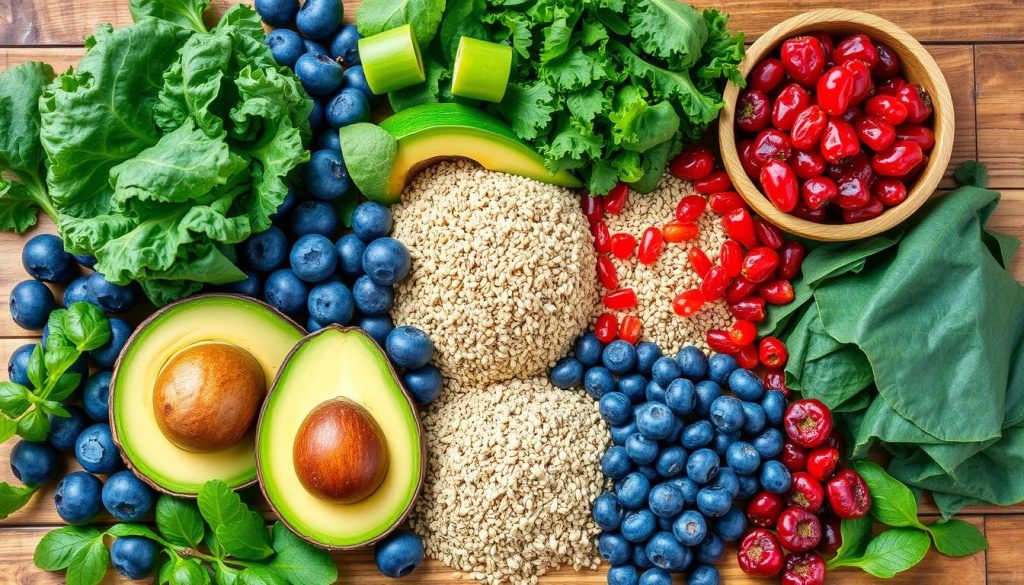
Mindful Eating: Nourishing Your Body and Mind
In today’s fast world, we often eat without thinking. But mindful eating helps us connect with our food. It makes meals more enjoyable and good for our health and mind.
Practicing Mindfulness During Mealtimes
Mindful eating means being fully present at meals. Don’t multitask or daydream. Instead, enjoy each bite, noticing flavors, textures, and smells. This way, you’ll feel more satisfied and listen to your body’s hunger signals.
- Slow down and chew your food well, letting flavors stay on your tongue.
- Stay away from TV, phones, or laptops while eating.
- Use all your senses to enjoy your food’s look, sounds, and smells.
Cultivating a Positive Relationship with Food
Mindful eating changes how we see food. It’s not just fuel but also a source of joy and connection. This view helps us have a healthier relationship with food, leading to better well-being.
Adding 10 foods high in magnesium: nourishing your body for optimal health and enjoying a healthy foods song supports your health journey.

Mindful eating is a great way to enjoy nourishing your body and mind. By eating slowly, savoring each bite, and having a good relationship with food, you find true fulfillment and well-being.
The Importance of Dietary Fiber
Dietary fiber is key to healthy eating habits and is vital for our health. It offers many benefits that can improve our well-being.
Fiber-Rich Foods and Their Benefits
Fiber is mainly soluble and insoluble. Soluble fiber helps control blood sugar and cholesterol. Insoluble fiber aids digestion and prevents constipation. Eating foods rich in both types of fiber can greatly benefit us.
- Fruits like berries, apples, and pears are full of soluble fiber. They help manage blood sugar and support heart health.
- Vegetables such as leafy greens, broccoli, and lentils are rich in insoluble fiber. They help with digestion and keep bowel movements regular.
- Whole grains like oats, quinoa, and brown rice have both soluble and insoluble fiber. They promote gut health.
- Nuts and seeds like almonds, chia, and flaxseeds are packed with fiber and vitamins. They offer both types of fiber.
- Legumes such as beans, lentils, and chickpeas are fiber-rich. They help stabilize blood sugar and reduce disease risk.
| Fiber-Rich Food | Soluble Fiber | Insoluble Fiber | Health Benefits |
|---|---|---|---|
| Apples | ✔ | ✔ | Cholesterol reduction, improved digestion |
| Broccoli | ✔ | ✔ | Blood sugar regulation, cancer prevention |
| Oats | ✔ | ✔ | Heart health, weight management |
| Lentils | ✔ | ✔ | Gut health, diabetes management |
| Chia Seeds | ✔ | ✔ | Inflammation reduction, nutrient absorption |
Adding fiber-rich foods to our healthy eating habits supports our health and well-being. It improves digestion and lowers disease risk. Dietary fiber is a simple way to nourish our bodies and enhance wellness.
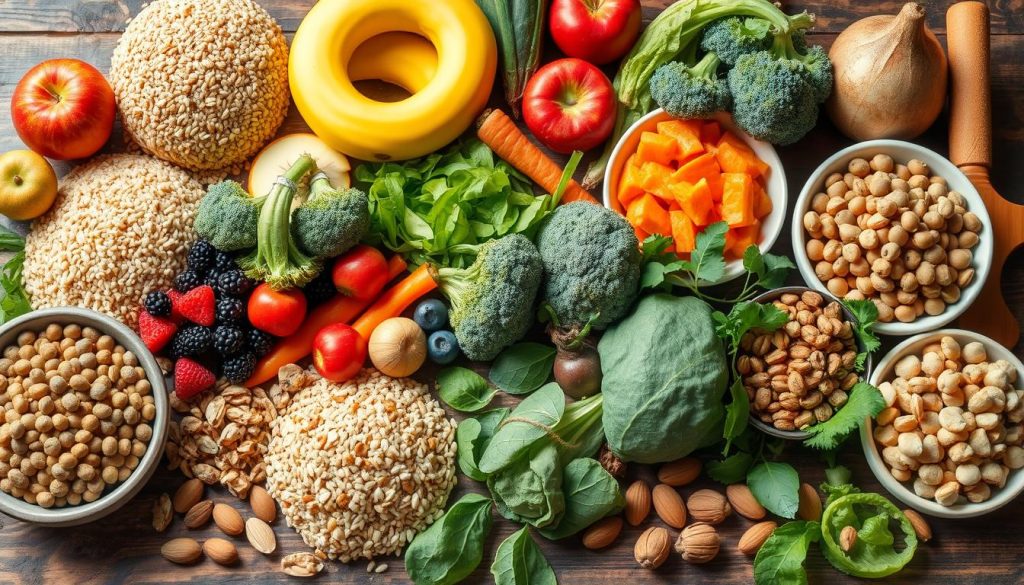
Organic Produce: A Healthier Choice
Choosing organic produce is a big decision for our families. Organic farming has many benefits. It’s better for healthy food for kids and adults.
Organic produce has less synthetic pesticides. These chemicals can harm our health. By picking organic, we reduce our exposure to them. This makes our food safer and more nutritious recipes for our families.
Organic farming also means our food is more nutritious. Organic crops have up to 69% more antioxidants. They also have more vitamins and minerals. This makes organic produce great for plant-based and meal prep diets.
- Reduced exposure to synthetic pesticides
- Higher nutrient content in organic crops
- Supporting sustainable farming practices
- Promoting environmental stewardship
Choosing organic produce is good for our health and the planet. It supports farming that’s better for the environment. This choice benefits us and the planet.

“Organic food isn’t just better for you, it’s better for the planet too.”
To make a healthier future, add more organic fruits and veggies to our meals. This is a simple but powerful step for our meal prep and healthy food for kids routines.
Plant-Based Meals: Versatility and Flavor
In the world of wellness, plant-based cuisine is a tasty and healthy choice. It uses nutrient-dense whole foods to make delicious plant-based recipes. These dishes are good for you and fun to eat.
Plant-based meals are no longer seen as boring or tasteless. Today, plant-based cuisine is full of flavor and color. You can make everything from tasty lentil stews to creamy sauces with cashews. There are countless ways to make healthy and tasty plant-based dishes.
Exploring Delicious Plant-Based Recipes
Start enjoying plant-based cooking with these tasty recipes:
- Roasted Vegetable Quinoa Bowl: A mix of roasted veggies, quinoa, and a tangy tahini dressing.
- Creamy Mushroom Stroganoff: A plant-based version of the classic, with tender mushrooms and a creamy cashew sauce.
- Sweet Potato and Black Bean Tacos: These tacos are full of flavor, with sweet potatoes, black beans, and a fresh lime-cilantro slaw.
Try the plant-based lifestyle and discover a world of tasty dishes. They’re good for you and delicious.
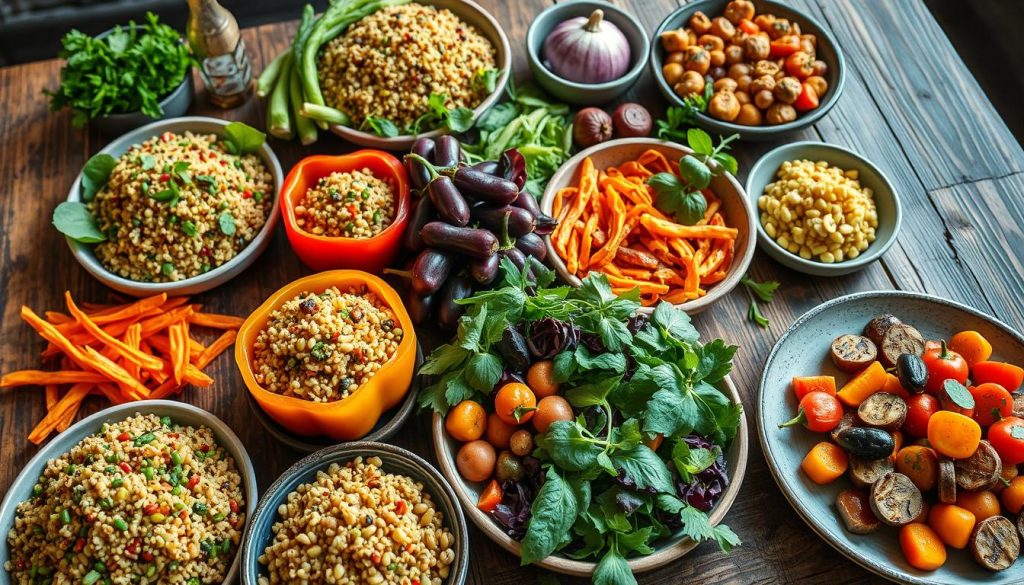
Healthy Food for a Wellness Lifestyle
Living a healthy life is more than just eating healthy foods. It’s about adding healthy habits to your daily life for overall well-being. A diet rich in nutrients, combined with other lifestyle choices, unlocks the full power of healthy living.
Integrating Healthy Habits for Holistic Well-being
To focus on wellness, consider these important elements:
- Regular exercise: Mix cardio, strength training, and flexibility to stay strong and full of energy.
- Stress management: Try meditation, deep breathing, or mindfulness to keep your mind calm and focused.
- Adequate sleep: Aim for 7-9 hours of sleep each night to help your body rest and heal.
- Hydration: Drink lots of water daily to keep your body hydrated and working well.
Adding these healthy habits to your life creates a powerful effect. It supports your holistic health and well-being. Eating healthy foods is just part of it. It’s the mix of a good diet and a balanced lifestyle that really helps you thrive.

“When you nourish your body with healthy foods and pair it with a wellness-focused lifestyle, you unlock the true potential for optimal health and vitality.”
Conclusion
Exploring healthy food choices shows that a whole-food, plant-based diet is key to well-being. By focusing on nutrient-dense whole foods, clean eating, and mindful eating, we can fully benefit from healthy food. It nourishes our bodies and minds.
Starting a journey towards a balanced diet and clean eating is more than just what we eat. It’s about how we connect with food. Superfoods and plant-based meals are packed with good nutrients. Dietary fiber is also vital for our health.
Healthy food is the base for a wellness-focused life. By eating mindfully and adding organic produce to our diet, we start a journey to better nutrition and overall well-being.
“Let food be thy medicine and medicine be thy food.” – Hippocrates
As we end this journey, we urge you to keep exploring healthy food. Embrace whole foods and discover the benefits of plant-based meals. Clean eating nourishes your body and mind. Your wellness journey starts with today’s choices.
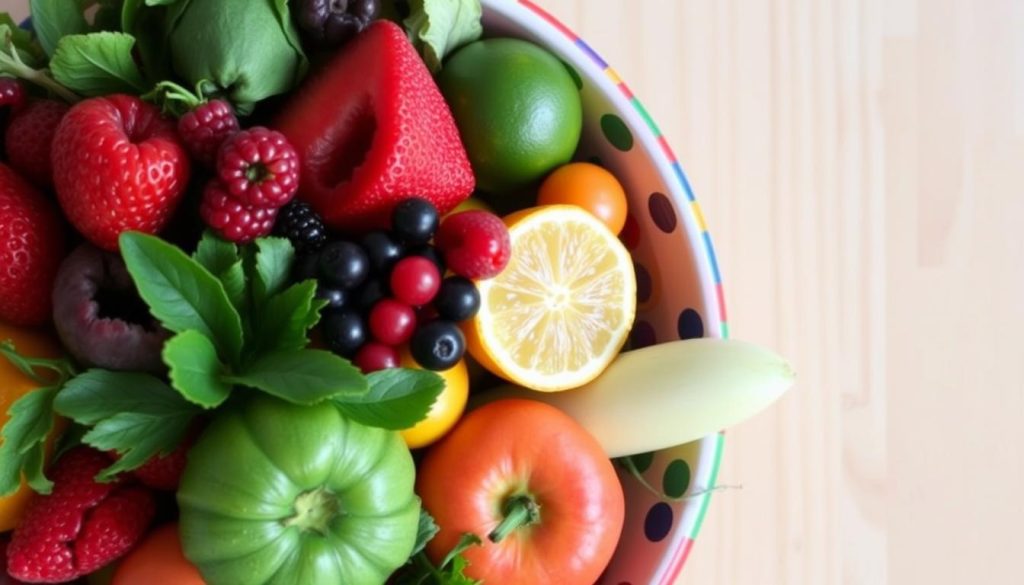
Nourishing Your Body with Healthy Food
Starting a journey with healthy food choices is a big step towards better health. This article has shown the good of whole-food, plant-based diets. It also talked about the importance of balanced nutrition and clean eating.
By adding more healthy foods, superfoods, and practicing mindful eating, you can see big changes. A healthy diet and heart healthy foods can change your life.
We’ve also talked about the value of dietary fiber and organic produce. We showed how plant-based meals are flexible and good for you. This knowledge helps you make better food choices for your body and health.
By choosing healthy eating and healthy foods, you start a journey to a better you. This is just the start of a lifelong journey to health and happiness.
FAQ
What are the benefits of a whole-food, plant-based diet?
A whole-food, plant-based diet is full of nutrients from fruits, veggies, whole grains, and legumes. It can boost heart health, improve digestion, and increase energy. It also lowers the risk of chronic diseases.
How can I incorporate more fruits and vegetables into my daily meals?
Adding fruits and veggies to your diet is easy. Try them in smoothies, salads, stir-fries, and roasted dishes. Snack on fresh produce or use them as meal bases.
What are the essential macronutrients and how do they contribute to a balanced diet?
The three key macronutrients are carbs, proteins, and fats. Carbs give energy, proteins build tissues, and fats support hormones and cells. A balance of these is vital for health.
Why is it important to eliminate processed and refined foods in favor of whole, minimally processed ingredients?
Processed foods have added sugars, unhealthy fats, and artificial additives. These can harm your health. Whole ingredients offer more vitamins, minerals, and antioxidants for your body.
What are superfoods and how can they support optimal health?
Superfoods are foods packed with vitamins, minerals, and antioxidants. Examples include berries, leafy greens, nuts, and seeds. Adding them to your diet boosts health and well-being.
How can practicing mindful eating enhance my relationship with food?
Mindful eating means eating fully present and enjoying your food. It builds a positive food relationship. This leads to more fulfilling meals.
What are the benefits of incorporating more dietary fiber into my diet?
Fiber is key for a healthy gut and overall health. Foods like fruits, veggies, whole grains, and legumes help with digestion, blood sugar, and heart health. They also keep you full.
What are the advantages of choosing organic produce over conventionally grown options?
Organic produce has less synthetic pesticides and may be more nutritious. Choosing organic fruits and veggies is healthier for you and the planet.
How can I incorporate more plant-based meals into my diet?
Try new plant-based recipes for more plant-based meals. There are many tasty options to nourish your body with plant-based foods.
How can I integrate healthy food choices into a broader wellness lifestyle?
Healthy eating is part of a holistic health approach. Combine it with exercise, stress management, and enough sleep. This supports your overall well-being.

